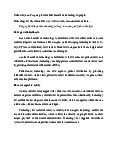

Preview text:
Virtue Ethics and Lab-Grown Meat: A Path to Moral Excellence
Virtue ethics, rooted in Aristotelian philosophy, emphasizes the development of good
character traits—virtues—as the foundation of ethical behavior. Unlike consequentialist
theories that focus on the outcomes of actions or deontological theories that emphasize duties
and rules, virtue ethics concerns itself with the moral character of individuals and their
pursuit of a good and flourishing life (eudaimonia). The advent of lab-grown meat, a
revolutionary technology in food production, provides a unique context to explore how this
ethical framework can inform and guide our attitudes and actions.
Lab-grown meat, also known as cultured or cell-based meat, is produced by culturing animal
cells in a controlled environment, thus eliminating the need for traditional animal farming.
This innovative method aims to address various ethical, environmental, and health issues
associated with conventional meat production. To examine lab-grown meat through the lens
of virtue ethics, it is essential to consider how this technology aligns with key virtues such as
compassion, temperance, justice, and wisdom.
Compassion: Reducing Animal Suffering
A central virtue in many ethical frameworks, compassion involves empathy and concern for
the suffering of others. Traditional meat production often involves practices that cause
significant suffering to animals, including confinement, inhumane handling, and painful
slaughter methods. From a virtue ethics perspective, promoting and adopting lab-grown meat
can be seen as an expression of compassion. By reducing or eliminating the need to raise and
kill animals for food, lab-grown meat addresses the moral concerns of those who are
empathetic towards animal welfare. This technology embodies a compassionate response to
the ethical issues surrounding animal agriculture, fostering a more humane approach to food production.
Temperance: Moderation and Sustainability
Temperance, the virtue of self-control and moderation, is particularly relevant in addressing
the environmental impact of meat consumption. Traditional meat production is a significant
contributor to greenhouse gas emissions, deforestation, water use, and pollution. The
excessive demand for meat drives these unsustainable practices, posing a threat to the
planet’s ecological balance. Lab-grown meat offers a more sustainable alternative, with the
potential to significantly reduce the environmental footprint of meat production. Embracing
this technology reflects the virtue of temperance, promoting moderation in our consumption
patterns and encouraging a more sustainable and balanced relationship with the environment.
Justice: Fairness and Global Equity
Justice, in the context of virtue ethics, entails fairness and the equitable distribution of
benefits and burdens in society. The current meat industry often perpetuates social and
economic inequalities, affecting both animals and humans. Workers in factory farms and
slaughterhouses frequently face hazardous and exploitative conditions. Moreover, the
environmental degradation caused by traditional meat production disproportionately impacts
vulnerable communities. Lab-grown meat can contribute to greater justice by addressing
these inequities. It has the potential to create safer and more humane working conditions and
reduce environmental harm, thus promoting a fairer distribution of resources and
opportunities. Supporting lab-grown meat aligns with the virtue of justice, fostering a more
equitable and just food system.
Wisdom: Informed and Ethical Decision-Making
Wisdom, the ability to make sound judgments and decisions, is a cornerstone of virtue ethics.
It involves practical reasoning and the capacity to consider the broader implications of our
choices. The development and adoption of lab-grown meat require a wise approach,
balancing technological innovation with ethical considerations. This includes addressing
potential challenges such as regulatory frameworks, public acceptance, and ensuring that lab-
grown meat is accessible and affordable to all. Demonstrating wisdom in this context means
carefully evaluating the benefits and risks, advocating for responsible practices, and making
informed decisions that align with the greater good. By doing so, we can navigate the
complexities of this emerging technology in a manner that promotes moral excellence.
Cultivating Virtuous Individuals and Societies
The virtue ethics perspective on lab-grown meat emphasizes the cultivation of virtuous
individuals who contribute to the betterment of society. By aligning our dietary choices with
virtues such as compassion, temperance, justice, and wisdom, we not only improve our own
moral character but also contribute to a more ethical and sustainable world. This approach
encourages individuals to reflect on their values and actions, fostering a culture of virtue that
extends beyond personal choices to influence broader societal norms and policies.
Conclusion: A Virtuous Path Forward
Lab-grown meat presents a unique opportunity to address some of the most pressing ethical
challenges in contemporary food production. Through the lens of virtue ethics, it becomes
evident that supporting and adopting this technology can be seen as a pathway to moral
excellence. By embodying virtues such as compassion, temperance, justice, and wisdom,
individuals and societies can contribute to a more humane, sustainable, and equitable food
system. Ultimately, the virtue ethics approach to lab-grown meat not only guides our ethical
decision-making but also inspires us to cultivate a virtuous and flourishing life, both for
ourselves and for future generations.




